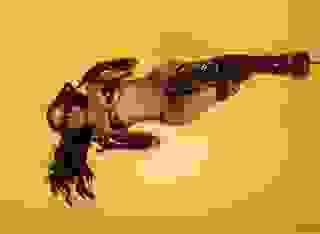- Non-Erotic Poetry
- Byrhtnothes Wīf (Byrhtnoth's Wife)
Note: You can change font size, font face, and turn on dark mode by clicking the "A" icon tab in the Story Info Box.
You can temporarily switch back to a Classic Literotica® experience during our ongoing public Beta testing. Please consider leaving feedback on issues you experience or suggest improvements.
Click hereA poem inspired by romance in Old English (Early Medieval) poetry, especially The Battle of Maldon and The Wife’s Lament.
Content warning: widowhood, grief. Also hi history belongs to everyone, Nazi medievalists fuck off.
She knew the day she married him,
in twilit haze of furs and sweat and mead-
sprays like tiny comets or
an army of migrating honey bees,
that Byrhtnoth’s pride was Byrhtnoth’s sin
and that dear fault his lasting virtue in.
Treasure had been brought in droves,
as if she were a saint or pageant’s queen
with garnet heart and blossom crown.
But gold had paled that night — the meat was lean,
the sultry wine was dark, loaves warm,
and Byrhtnoth’s men like bears roamed through the charm.
He’d always seem a bear to her;
that paradox of lumbering elegance,
that snuffling moan in sleep that night
would make her smile, his pounding, toppling dance,
his poignant stare, his wild helm.
And, frail as cubs, they both were overwhelmed.
But poetry is written not
for bears or wives of warriors and lords.
When thirsty blades are quenched, shields ripped,
the bards forget her casualty of war.
Curdling with the blood and sand,
a woman’s ghost amidst the fallen band.
Their mead-hall’s light bewildered her.
The English air turned foreign as the moon.
The rivers ran with ashen song.
From thickets of her grief she wove a tomb.
“No, carve a ship,” her dreams beseeched,
but Byrhtnoth’s isle was one no sea could reach.
Silver dogs and scarlet vigil fires.
She let his shadow melt into the flare.
But if you were to stand like him,
I’d shed my skin and make myself a bear,
and if black ravens took you far,
I’d be your Ursa Major in the stars.
You may not be my king, but still I swear:
you will not face the wolves alone,
I’ll match your pride with mine, my heart’s my throne.
Author’s Note
I studied these poems way back when at uni and wrote this for my partner when we were still just nerdy Medievalist students. Byrhtnoth was the Early English hero of the Battle of Maldon, leading the fight against Norse raiders. He had the advantage, defending the crossing of a river that would have forced the Norse into a bottleneck, but to preserve his honour he allowed the Norse to cross to him peacefully and fight fairly once on the same side. He lost the battle and his life, but was commemorated for the ideal of “overmod”, which we don’t really have a direct translation for, but literally means “over-heartedness”. Lots of Early English poetry bittersweetly explores an ideal of masculinity in which you have so much heart, spirit, communal love, compassion, and honour that it takes precedence over victory and even survival. These men were idealised for their values, but mourned for sacrifices they deserved to be spared. They leave us questioning whether honour has too high a price, but fearing what we would be without it. I found it extremely romantic and think we should absolutely bring it back into language.
Thank you for reading! For more writing you can find me on Instagram and Twitter @shawberrytart xx
- COMMENTS
5 Stars from me. Amazing writing. I love these types of poems, as the words seem to dance and play with and off each other. And I appreciate the historic footnotes.








